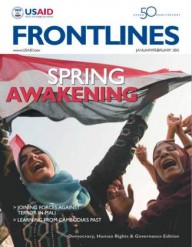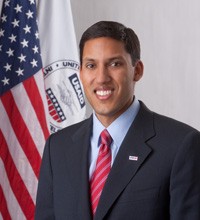About a year ago, on Dec. 18, 2010, Tunisians took to the streets and began to issue a call for freedom that would echo across the region. In the historic months since, the sacrifices and achievements of Tunisians, Egyptians, and Libyans have inspired citizens in cities as far away as Moscow, Harare, and Rangoon. Demonstrating the fundamental importance of human rights and democracy, these reform movements have been rooted in the concurrent struggle for a greater voice and a more secure livelihood.
President Barack Obama and Secretary of State Hillary Rodham Clinton have both emphasized the close relationship between protecting human rights and advancing long-term, sustainable development.
In June 2011, I gave an address at our agency’s Democracy, Human Rights, and Development Conference, discussing how we can better integrate democracy and human rights efforts with our core development mission. I spoke about how human welfare is defined not only in terms of freedom from hunger or poverty, but also respect for individual dignity. And I described several actions we’re taking at USAID that will be key to strengthening our efforts to support both economic and political reform.
We are using the creation of our new Center of Excellence on Democracy, Human Rights, and Governance to strengthen the culture of data, evidence, and evaluation in our democracy programming. What the MIT Poverty Action Lab has done for development effectiveness, our Center of Excellence can do for democratic effectiveness, devising new metrics and measuring performance to determine what really works.
We are also creating a new track of funding—with pre-existing resources—within our presidential initiatives to support smart investments in human rights and governance. We will continue to support our core democracy, rights, and governance work, but we will also use resources we have already committed to the initiatives to create a new, formal funding channel for human rights and governance programming. This second track of funding is designed to improve the sustainability of our development efforts.
And we are adapting the financial risk assessment tool of government-to-government assistance we developed through USAID Forward to include consideration of democracy, rights, and governance. This review will determine whether our investment would empower a government at the expense of its people. If so, we will explore options to ensure that our assistance does not compromise the rights of citizens. And we will seek to work with those governments to improve their democratic practice so that they will be able to receive future government-to-government assistance.
As we support democratic transitions, we must not lose sight of what expanded freedom means for the individual. When we invest in a smallholder farmer in Uganda, we invest in an entrepreneur with a growing interest in a free society. When we help a mother safely give birth, we help expand her stake in her country’s future. And when we support the rights of citizens to vote a corrupt leader out of office, we support the assertion of their dignity.
The value of investing in democracy extends beyond the borders of any single country. By helping governments and societies protect the basic rights of citizens, we spur economic growth, prevent conflict, and forestall the need for possible military engagements. Through the integration of democracy, human rights, and governance into our broader development portfolio, we will deliver a truer understanding of human welfare as we build a safer world.










Comment
Make a general inquiry or suggest an improvement.